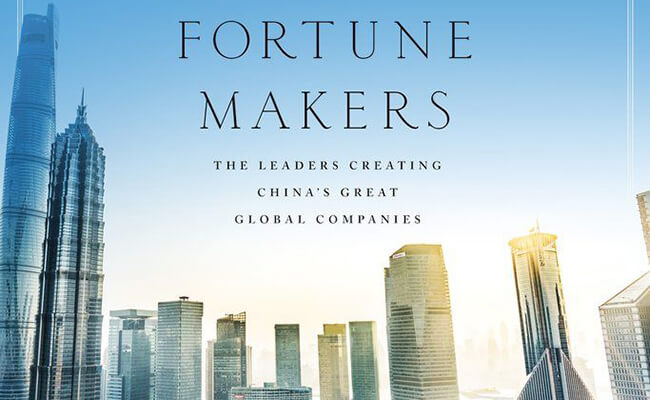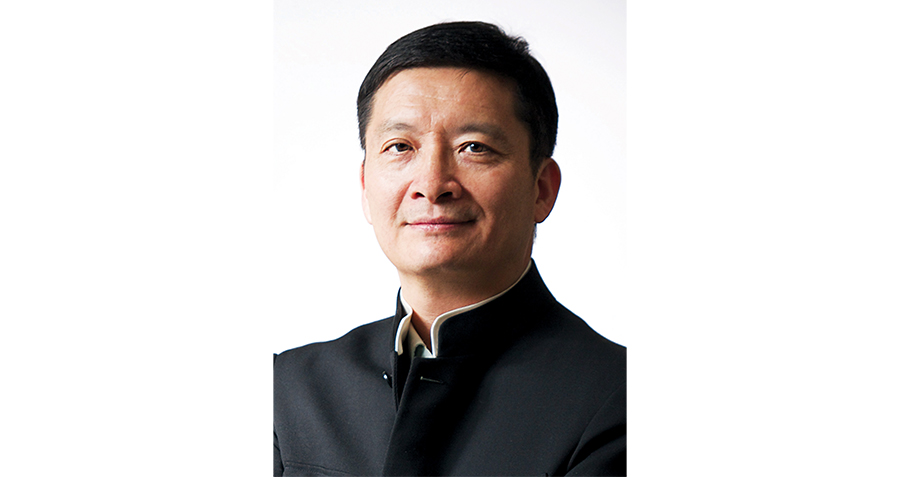Peter Cappelli, George W. Taylor Professor of Management at The Wharton School, University of Pennsylvania, discusses the business practices of China’s most successful private companies
China is now home to many of the world’s largest and most dynamic private companies. But apart from a few exceptions like Alibaba’s Jack Ma, little is known outside China about the intrepid entrepreneurs who built these business empires, often against astonishing odds.
Professor Peter Cappelli and his colleagues at The Wharton School, University of Pennsylvania, are trying to change that. Over the past few years, they have interviewed the leaders of China’s biggest private companies, including Lenovo, Tsingtao, Geely and Vanke. Last year, they shared their findings in Fortune Makers: The Leaders Creating China’s Great Global Companies.

Like the team’s previous book, The India Way, which profiles India’s top business leaders, Fortune Makers is an attempt to identify a set of attitudes and practices common to the target country’s CEOs. But as Cappelli tells CKGSB Knowledge, outlining a “China way” was a surprisingly complex task.
Q: Fortune Makers sets out to define a distinct Chinese business mentality. What are the unique features of the Chinese approach to business?
A: One conclusion we reached was that China is not as neat a story as India. India has a clear model. The Chinese founders that we spoke to are in some ways not that different to the founding entrepreneurs of the United States a hundred years ago, in that they are the first movers in industries that have become very big. But there are attributes of who these people are that are distinct, because anyone who wanted to be a capitalist in a country that loathed capitalists was a pretty unusual person.
For a lot of Chinese founders, trying to make money was a way to establish personal security in a country where it wasn’t obvious how you might do that. If you had lived through the Cultural Revolution, for example, everything that people thought led to success was suddenly tossed in the air. And if you lived through that, part of what motivates you is, “I don’t want that to happen again.”
So, one part of the “China way” is that the people are very different, but the context is

also different: China provided enormous opportunities in a way that India, for example, absolutely did not. India’s government is a pain; the infrastructure is terrible. The joke in India is that the economy grows at night, while the government is asleep.
In China, a lot of the homogenizing effects of communism were actually perfect for helping entrepreneurs’ activities flourish: standardization, a certain stamping out of diversity—in China a hundred years ago, you certainly would have seen more diversity in terms of clans, ethnicities, languages and so on—and a certain level of materialism.
So, part of the story is of people who were individualistic and strongly motivated to make money in a time where the opportunities to do that were extraordinary.
Q: What is unique about Chinese companies from an organizational or cultural perspective?
A: In terms of the way Chinese founders think, there are several things. One is that they think long term in a way you don’t see in the West. Some of that is because they don’t have short-term investor constraints.
Another part is that they’re after market share, not for sophisticated strategy reasons, but because they believe—and they’re probably right—that if you are a really big company you are much more secure in China than if you are a small company that generates tons of money, which would be the US model. I think that’s partly why Chinese entrepreneurs are more willing to make much bigger investments, because of the more long-term orientation.
The emphasis on learning [inside Chinese companies] was also striking. And learning in a very traditional, academic way. Many companies require executives to write book reports and to spend time reading traditional academic works, going to training classes or bringing in experts. There’s an openness, a recognition that we could really get better fast if we use these folks.
They can execute that because of the extraordinary top-down centralization of the “China way”: all you need is the founder. That’s another quirk of these companies, of course, that the founder is still around. The founder can just say, ‘you’re all going to do this.’ In US companies, power is more decentralized.
The thing that was most positive that struck me came from the traditional Chinese “big boss” model: the loyalty to the individual leader. This ran both ways, as the CEOs were pretty loyal to those in their immediate circle. What that meant was, if you were willing to be a team player, if you made it to the inner circle, they cut you a great deal of slack. If you screw up, they’re not going to fire you. But the requirement is, if you’re in trouble, you don’t try to hide it.
The advantage is that they don’t need the elaborate control systems that you see in Western companies. If you compare it to a US company, they have all these layers of internal accounting to try to figure out what’s going on and head off problems, because, frankly, they don’t trust the people on the ground to act in the interests of the company.
Q: You mentioned that many of the Chinese founders you profiled came from the generation that grew up before capitalism was legitimized. How formative were these experiences, in your view?
A: I think they were fundamental. It’s not like they had a complete reaction against communism either, that’s not true. They embraced lots of it, and you can still see many manifestations of communist behavior in the way they do things. For example, you see people who make mistakes in these companies undergoing “re-education” where they’re dressed down publicly and asked to write accounts of why something went wrong, and what you’re going to do about it going forward.
I think most of these folks were at a formative age during the Cultural Revolution, and it’s hard to believe that it wouldn’t leave a mark on you.
Q: What could companies in the US learn from their Chinese counterparts?
A: Practically, I think American businesses could benefit from understanding how these companies operate, because you’re competing against them. Chinese companies take a long-term view, they focus on market share and growth, they’re willing to pay a price to get that and they’re not always under pressure to meet quarterly goals—businesses need to understand that.
I think there are weaknesses there, too. For example, Chinese companies are not good at developing talent and at managing complex organizations. They often struggle once they go abroad as they’re not great at understanding and accommodating local cultures. They’re also not yet developing a strong cohort of leaders. Some of that is due to the strong top-down model and some because, if you’re not international, you don’t have to give managers authority and autonomy in the way you do if you have subsidiaries in other countries.

Q: How exportable are Chinese business practices? Would they work as effectively in a Western-style market?
A: My gut feeling is that Chinese businesses will start struggling soon because most rely on people who are willing to follow orders. They’ve now got a big cultural divide within the country with the one-child family kids [born in the 1980s and 1990s], who are beginning to run things and populate the lower ranks of management in companies. I don’t think the “just-do-it-because-I-said-so” stuff will go over so well with those folks.
The other thing I wonder about is that, in lots of companies worldwide, the great successes come from pushing authority down closer to the ground and front-line level: everybody is trying to do that. But they’re not trying to do that in China. So, I’m not sure how well that style is going to work elsewhere.
If you look at the Indian companies, for example, there are a lot of Indian CEOs moving into jobs in companies around the world. I don’t think I’ve ever seen that of a Chinese CEO. That’s a pretty good marker of the nature of the challenge, I think.
Q: Could you elaborate on that? Why do you think it has been easier for Indian CEOs to transition to running companies abroad?
A: Well, I think Chinese companies don’t operate like European or American companies do. The big challenge of working through people, which is the problem of corporations, in China is not a big deal. But in the rest of the world it is a big deal. Trying to develop commitment and engagement from your employees is a big challenge in most of the world; it has not been in China, though it may start to be pretty soon.
Q: As Chinese companies increasingly expand overseas, do you think the “China way” will influence the business cultures of other countries?
A: I don’t think so. But I think that’s a high bar, because even when Japanese car companies were operating in the US, American car companies weren’t copying the Japanese companies.
I think that the things that are good about the Chinese companies are so unique to the Chinese context. Like the fact that they can take this long-term view and can move very quickly because they don’t have all these internal systems: those can be real assets, but they don’t translate elsewhere. A US subsidiary of a Chinese company is not going to be able to maneuver in the US any better than any other company. They’re headquarter assets; they’re not country assets.
Q: You alluded to the generation gap in China. How do you expect Chinese companies will adapt to the entry of an increasing number of “post-90s”?
A: I’d say with difficulty. We talk to senior people from these companies frequently because they come [to Wharton] for executive education, and they’re puzzled about the behavior of employees, and particularly young people. Even with simple questions like, “we don’t understand why people are quitting, why these young people are moving.”
Part of that is because they don’t have systems in place to answer those questions, but part of the reason they don’t have those systems in place is because they don’t understand why the questions should even exist. So, I think it’s going to be difficult for them to handle.
Q: Do you think these societal changes will force Chinese companies to become more like global companies?
A: I do. And I think they already are. You know, they’re borrowing so heavily from US consulting companies: they’re basically setting everything up for them. So, I think they’re not going to look like global companies. They’re going to look like US companies.
And to some extent they do [already]. I mean, if you think about the workforce issues that I look at, they’ve got all the practices of US employers in human resources. They don’t know how to execute them often, but they’ve got them. They have the pay systems with all the pay grades, and so on.
Q: What are the strengths and weaknesses of these younger generations in China, who were born after 1980?
A: Well, they’re more global, and that’s interesting if you’re going to be a global company. The education standards have improved a lot, and there’s more people going to college. I think so far that has not been very useful in China, because the supply of college graduates has vastly exceeded the demand. Some of that is because, compared to a lot of Western countries and Western companies, they don’t have all these middle-management jobs. And they don’t yet quite have the service culture that you see in the US.
These folks are interested in having, I think, more autonomy, and that’s going to be useful if Chinese companies want to compete the way most companies find it necessary to compete, which is that people closer to the markets need to be tasked with making decisions, passing information along and things like that.
Q: Is there a risk that these younger generations will be less dynamic than their predecessors?
A: For sure. In all developing countries, particularly ones that have developed as quickly as China has, the material rewards from working within the system have been astonishing: hundreds of millions of Chinese lifted out of poverty. You’re not going to see anything like that again. The ones who got pulled out of poverty into the working class are not going to become middle-class in the next 20 years: that pace of change is impossible to sustain. So, they’re not as hungry.
Q: What advice would you give Chinese companies struggling to adapt to this new reality?
A: They must get better at management. So far, in terms of what they have gotten better at, it’s lots of aspects of business, particularly, of course, on the production side—in manufacturing, they’re good and, in some places, world-class. But on other aspects, they’re not [world-class], particularly around management.
They’re going to have to start worrying about people behaving, especially because one legacy of communism is that a lot of these companies have not done an awful lot of firing people. And the government, of course, has been very concerned to make sure that they don’t do lots of layoffs.
So, how are you going to manage when you’re not good at management and you can’t fire people? That’s an interesting question, and there’s not an obvious answer.
















